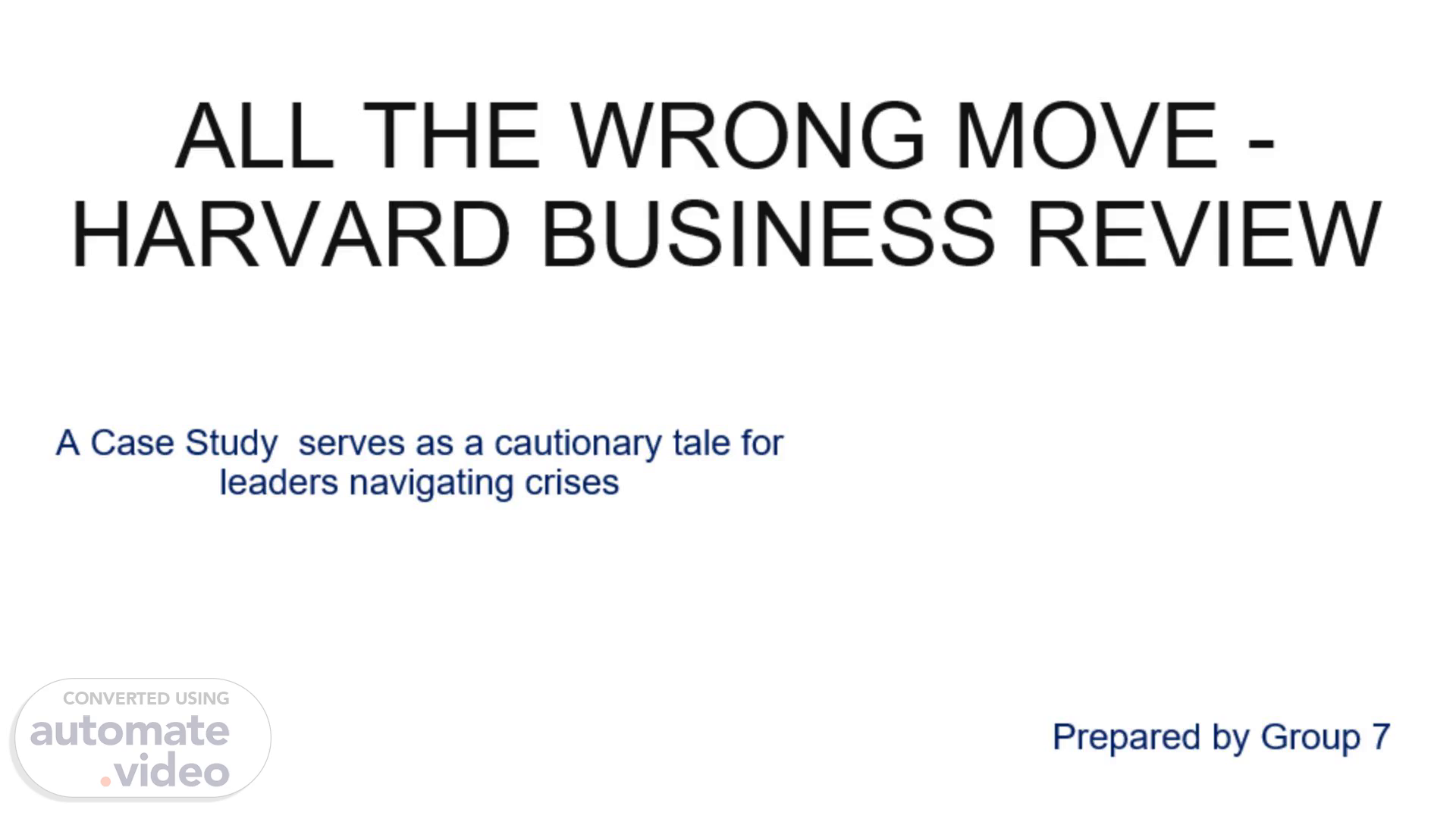
Page 1 (0s)
[Audio] ALL THE WRONG MOVE - HARVARD BUSINESS REVIEW A Case Study serves as a cautionary tale for leaders navigating crises Prepared by Group 7.
Page 2 (10s)
[Audio] Summary: Nutrorim's reputation suffered significantly due to the crisis, emphasizing the critical importance of effective crisis management and decision-making for any organization. Nutrorim is facing decision making crisis. Overall process of decision making though seems democratic from ceo's perspective but is disorganized overall. Product recalled without proper due diligence and factual questioning to the investigators for proofs etc. Probable Solutions: Loss of Trust: Customers, investors, and the public lost trust in Nutrorim. The lack of transparency and inadequate crisis communication eroded confidence in the company's leadership. Negative Media Coverage: The crisis attracted significant media attention. News outlets highlighted Nutrorim's mishandling of the situation, further damaging its reputation. Legal and Financial Fallout: Nutrorim faced lawsuits, regulatory investigations, and financial losses. The recall of the sports supplement led to financial setbacks and legal battles..
Page 3 (1m 19s)
[Audio] Mistakes by Don Rifkin, the CEO of Nutrorim mistakes during the crisis which highlight the complexities of leadership and decision-making, especially during challenging times. This Story serves as a cautionary tale for leaders navigating crises Lack of Transparency: Rifkin's decision to withhold information about the recalled sports supplement from the public and his employees was a significant error. Transparency is crucial during a crisis, and withholding critical details can exacerbate the situation. Inadequate Crisis Communication: Rifkin failed to communicate effectively with stakeholders, including customers, employees, and investors. Clear and timely communication is essential during a crisis, but Rifkin's approach fell short. Ignoring Expert Advice: Despite receiving advice from experts, Rifkin chose to downplay the severity of the crisis. Ignoring expert opinions can lead to poor decision-making and worsen the situation. Overreliance on Democracy: While democratic decision-making is valuable, Rifkin's insistence on involving everyone in the decision process hindered swift action. In a crisis, decisive leadership is often necessary. Failure to Learn from Past Mistakes: Rifkin's decisions were influenced by past experiences, but he failed to learn from them. Repeating mistakes can have severe consequences for an organization..
Page 4 (2m 49s)
[Audio] Key Takeaways: Proactive crisis management and thoughtful decision-making Transparency Matters: During a crisis, transparency is paramount. Companies should promptly share accurate information with stakeholders, including customers, employees, and investors. Concealing critical details can exacerbate the situation and damage trust. Effective Crisis Communication: Clear and timely communication is essential. Companies must have a well-defined crisis communication plan. Regular updates, addressing concerns, and acknowledging mistakes are crucial for maintaining credibility. Balancing Democracy and Decisiveness: While democratic decision-making is valuable, leaders must strike a balance. In a crisis, decisive action is often necessary. Involving everyone in every decision can hinder swift responses. Learning from Past Mistakes: Organizations should learn from past experiences. Repeating errors can have severe consequences. Regularly evaluate decisions, analyze outcomes, and adapt based on lessons learned. Reputation Recovery Takes Time: Nutrorim's reputation took years to recover. Companies should recognize that rebuilding trust and credibility after a crisis is a gradual process. Consistent positive actions are essential. Expert Advice and Humility: Leaders should listen to expert advice and be willing to adapt. Humility in decision-making prevents arrogance and fosters better outcomes. Employee Morale and Well-Being: Crisis impacts employees too. Companies should prioritize employee morale, mental health, and well-being during challenging times..
Page 5 (4m 35s)
[Audio] Problems 1. Lack of thorough background checks: Nutrorim purchased a stake in Dipensit without verifying the credentials of the CEO, Wally Cummings, who was later found to have lied on his resume. 2.Ineffective decision-making process: There are issues with Nutrorim's decision-making process, including a tendency towards consensus-driven decisions, difficulty in making decisions involving clear winners and losers, and a lack of timely decision-making. 3.Product recall crisis: Nutrorim faces a crisis when its product, ChargeUp with Lipitrene, is linked to cases of gastrointestinal distress. 4.There is a debate within the company about whether to recall the product, which could impact the brand reputation and incur significant costs. Communication breakdown: 5. There is a breakdown in communication between different departments, as seen in the disagreement between the PR director and the head of R&D regarding how to handle the product recall crisis. Cultural issues: There are cultural issues within the company, including conflicts between different management styles (e.g., democratic vs. dictatorial) and frustration among employees with the decision-making process and excessive meetings..
Page 6 (5m 58s)
[Audio] Solutions : Strengthen background checks: Implement a more rigorous process for verifying the credentials of key personnel in companies where Nutrorim plans to invest. Improve decision-making process: Develop a framework for decision-making that addresses the company's tendency towards consensus-driven decisions, facilitates faster decision-making, and ensures that decisions are made based on comprehensive analysis and consideration of potential risks. Crisis management strategy: Develop a comprehensive crisis management strategy that includes protocols for handling product recalls, effective communication with stakeholders, and cooperation with regulatory agencies. Enhance communication: Improve communication between different departments and management levels to ensure that information is shared transparently and decisions are made collaboratively. Cultural change initiatives: Address cultural issues within the company by fostering a more open and inclusive decision-making environment, providing training on conflict resolution and effective communication, and promoting a culture of accountability and continuous improvement..